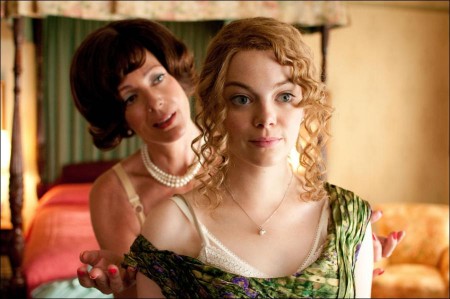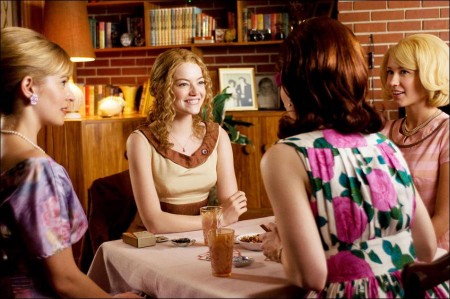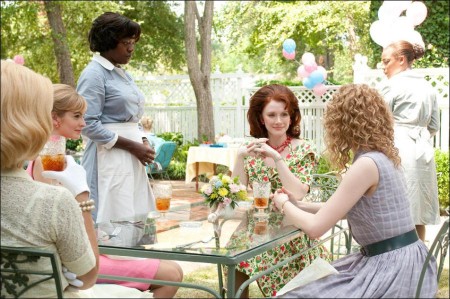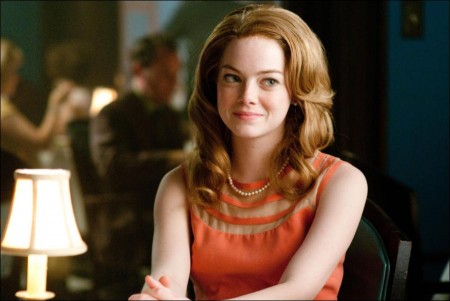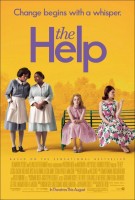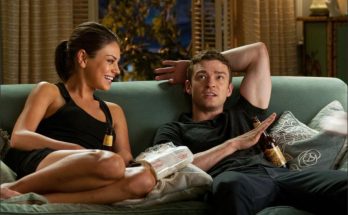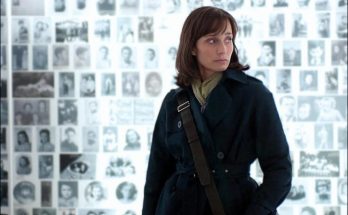Taglines: Change begins with a whisper.
Based on one of the most talked about books in years and a #1 New York Times best-selling phenomenon, “The Help” stars Emma Stone as Skeeter, Academy Award–nominated Viola Davis as Aibileen and Octavia Spencer as Minny—three extraordinary women in Mississippi during the 1960s, who build an unlikely friendship around a secret writing project that breaks societal rules and puts them all at risk.
From their improbable alliance a remarkable sisterhood emerges, instilling all of them with the courage to transcend the lines that define them, and the realization that sometimes those lines are made to be crossed—even if it means bringing everyone in town face-to-face with the changing times.
From The Page to the Screen
As friendship is so vital to the story of “The Help,” so was friendship vital to how the film became a reality. Director / Screenwriter Tate Taylor and Kathryn Stockett, author of the book “The Help,” were childhood friends who grew up together in Jackson, Miss., in the 1970s. Taylor and Stockett’s longtime, trusting friendship formed the basis of the film’s journey and along the way they added another friend, Jackson native Brunson Green, to their mix, who Taylor had met at a blues festival in Jackson some 18 years prior. Then another friend, Octavia Spencer, joined their pack. Taylor met Octavia Spencer in 1996 when they were both production assistants on “A Time to Kill.”
After the movie wrapped, Taylor and Spencer packed up and moved to Los Angeles together. Taylor, Green and Spencer all hung out in Los Angeles, with frequent visits from Stockett, who was off getting married, having a baby and living in New York City.
After taking five years to write the novel, which Stockett started right after 9/11 when she was in New York, and facing over 60 rejections from literary agents, Stockett was close to giving up when she gave it to Taylor for a read. As Taylor recalls, “I started reading the manuscript and was blown away. I was moved by the truth of the story, about these unlikely women coming together to create change in Mississippi in 1963. I called Kathryn and just said, ‘This is fantastic. You cannot give up… this will be published. If it doesn’t, I’ll make it into a movie.’”
The authenticity of the story of “The Help” resonated with Taylor from the moment he opened the manuscript. “This was our childhood. Kathryn and I weren’t quite raised like the characters in the book because we were raised in the ’70s. But our mothers were single moms who had to work. And they, like the women in the story, needed to get help with the children. Kathryn and I like to refer to the women who raised us as our co-mothers. Mine was Carol Lee and hers was Demitri.”
Excited by the prospect of making “The Help” into a film, Taylor started the ball rolling by sending the manuscript to their mutual friend, producer Brunson Green.
Green recalls, “I was in New York and Tate said ‘I am going to send you this book. Read it immediately. We need to make it into a movie.’ I read it on the flight home and I was crying on the plane. It reminded me of my grandmother’s housekeeper, Mary, and their rich, lifelong yet complex relationship.”
With Stockett’s blessing, Taylor, with the help of Green, acquired the film rights to “The Help” and Taylor began to adapt the novel into a screenplay. Taylor definitely had a feel for the material as he committed himself to bringing the complex, inspiring and surprisingly humorous novel to the big screen. “These women would not be allies at that time for reasons of race and class,” says Taylor. “It’s easy to be quiet. You think that there is no benefit from speaking up, or maybe you are just lazy and want to go with the status quo. But, I think what this book shows people, and I hope the movie will show people, is that the smallest thing can affect change.”
The challenge for Taylor in writing the screenplay was to be honest to the voice of the novel and condense it into a two-hour movie. As Taylor comments, “The technical issue for me was getting the first 200 pages of the novel into 20-25 minutes of the script. But, I know this material. I read the book about 13 times and I would circle the things I really liked in the novel. “Once I starting writing, it just began to flow. Kitty [Kathryn Stockett] and I have the same sense of humor and we tell stories the same way. She was generous enough to let me run things by her.”
About a year later, in 2009, “The Help” was published by Penguin Books. Spurred by passionate word-of-mouth from readers, “The Help” stayed on the New York Times bestseller list for 103 weeks, six of which were in the No. 1 spot.
Tate Taylor happened to be traveling through Alabama with Kathryn Stockett and Brunson Green following a book signing in Jackson, Miss., en route to Atlanta, the last stop on the book tour, when Stockett received a call from her publisher. They quickly pulled over at a truck stop to hear the news from the publisher—“The Help” was debuting on the New York Times bestseller list.
Green recalls, “I snapped a photo of them celebrating in front of the truck stop with their Smirnoff Ices. Kathryn was literally on the phone with her publisher and very excited.”
At that point, Taylor and Green worked actively to find a veteran producer to partner with them on “The Help.” They realized that their primary filmmaking experience had been in the world of independent film, so they looked at bringing in another producing partner with studio credibility.
“We started with baby steps, in the development of the script, in getting the right partners. We really needed someone who had the legs, someone who had done huge movies like ‘Harry Potter’ and that was Chris Columbus and 1492,” explains Taylor.
And it was only natural that Taylor would take the project to Producer Chris Columbus as he had known him for some time. When Taylor asked him to read the book, Columbus agreed. “I read the book and it was phenomenal,” Columbus says. “It was so complex and socially relevant for our time.”
Columbus was also impressed with Taylor’s screenplay and felt strongly that Taylor was the best choice to direct the project. As he explains, “Tate’s the only guy who could have directed this movie because he lived in this world; he grew up with these people. He understands every detail, every nuance. And that’s what you look for in a director.”
The next step was to find a studio that would support the filmmakers’ vision of turning “The Help” into a feature film. This was not an easy process as Taylor and the producers found themselves also meeting rejection, just as Kathryn Stockett had with the book.
Then what they all had worked and hoped for happened. “DreamWorks came in and really supported Tate directing the film and that really was the kick off,” says Columbus.
“DreamWorks’ Stacey Snider [Partner, Co-Chairman, CEO] said, ‘I can’t let this go,”’ Columbus recalls. “And it was because of Stacey and Steven Spielberg, who stepped in and agreed to make the movie, that we were able to fulfill Tate’s vision.”
Green adds, “DreamWorks came on board, which was phenomenal. They care about the filmmakers and they don’t want them to feel compromised in any way. They give the director the freedom to tell his story.”
Just as the novel attracted millions of readers around the world, the filmmakers are hopeful that the novel’s universal themes will resonate with moviegoers. “I think the key to the book’s success is that the subject matter is finally being told from the point of view of the most obvious people, which are these women. I think it takes us back to a time and place that has been forgotten and that is still really important to us,” says Taylor.
Casting “The Help”
One of the biggest responsibilities in casting “The Help” was living up to the book readers’ expectations. Everyone who loves the book loves the characters, and the filmmakers felt a great obligation to the readers to bring them to life in an authentic way, while at the same time casting with an eye for reaching the audience who had never read the book and bringing them into the world of “The Help.” They searched for actors who could transcend who they are as a personality and become the real, honest characters that were in the novel.
Director Taylor says, “When we were looking for actors, I was looking at how they talked, the way they moved…and these actresses just have such great body language that I swear they could be in Jackson, Mississippi. That really guided me a lot of the way. It’s just a regional authenticity.”
Producer Michael Barnathan confirms, “Tate didn’t want a ‘Hollywoodized’ version of the South. He wanted to have it feel authentic. So that was his gauge for assessing the actresses.”
In many ways the character Aibileen is the heart and soul of “The Help.” She is also perhaps the most complex and conflicted of the women. For this allimportant role, the filmmakers were thrilled when two-time Tony Award® winner and Academy Award nominee Viola Davis (“Doubt,” “Eat Pray Love”) read Tate Taylor’s screenplay and accepted the role. However, it wasn’t an easy process to lock her down.
As producer Brunson Green recalls, “We loved Viola and rightfully so. She subtlely conveys the strength of the character, which made her the perfect Aibileen. We weren’t certain that we could get her for the role, since she was committed to her Tony Award®–winning role on Broadway’s ‘Fences,’ but timing was on our side and everything fell into place.”
“Viola is just power. She brings such truthfulness to the role. The role of Aibileen with the wrong actress could turn into a cliché, but Viola brings a bravery to this role that will break your heart.” —Tate Taylor, director
“For me it felt like a movie where it wasn’t just a chance for me to create a character that was interesting and complicated but it was also a chance for me to be in a movie that illuminated a part of our history that we have a tendency to be silent about,” says Viola Davis of her heart-rending portrayal of Aibileen, the maid who agrees to tell novice writer Skeeter Phelan (Emma Stone) the painful and potentially incendiary stories about her life.
“I see Aibileen as being a reluctant hero,” continues Davis. “She is just getting by after her son dies, just being invisible, until Skeeter enters the picture. And what Skeeter stimulates in her is the excitement of having a purpose, something else to drive her life, which is telling her story. I want to honor Aibileen.”
Emma Stone (“Easy A,” “Zombieland”) was a hands-down favorite to portray Skeeter Phelan primarily due to her scene-stealing vulnerability in a series of comedic movies. As Skeeter, Stone portrays an Ole Miss graduate who has come back home, is living with her parents, unmarried and desperately in search of a career in journalism.
“No one else could be playing Skeeter except for Emma Stone. Kathryn, the author, feels the same way. I met Emma and saw some of her work and it was just so obvious. She is so smart and she brings to the character of Skeeter this intelligence, a healthy naiveté, and you just root for her. You want her to win. She is the perfect underdog in so many ways. She is the swan waiting to mature,” says Taylor.
Columbus adds, “The character of Skeeter represents someone who, although she comes from a narrow-minded small town, has the ability to leave and go on and have a career. She is fighting two things in her life. She is fighting her family and her town for acceptance. Emma brings the character of Skeeter to life. Emma has a real, strong sense of naturalism and for what feels right for this character.”
Emma Stone describes Skeeter as “a bit of a misfit. Someone who has never been rebellious, she has always conformed to the laws of her society, her family, her friends. But, when it comes to writing, as time goes on, and as the story unfolds, she begins to understand that her way of thinking is more progressive than the people in her town. In a way, it’s a coming-of-age story for Skeeter.”
One of the most difficult roles to cast was that of the antagonist Hilly Holbrook. “Hilly is that type of villain who has no idea that she is doing anything wrong,” says Brunson Green.
Chris Columbus agrees, “I always thought of Hilly as probably one of the most important characters to cast in the film. When I read the book and the script, she reminded me very much of Louise Fletcher’s portrayal of Nurse Ratched in ‘One Flew Over the Cuckoo’s Nest,’ someone who wholeheartedly believes that what they are doing is absolutely right, absolutely moral. She believes in her own selfrighteousness.”
Bryce Dallas Howard (“Hereafter,” “Terminator Salvation”) isn’t necessarily the first person you’d think of to portray an iconic villain, but the filmmakers all agreed that she was the right actress to portray Hilly Holbrook.
“Bryce Dallas Howard did a fantastic job. Bryce has the charisma that Hilly needs to lead. She has the positivity. But, she can also turn on the ice-cold B-word like you can’t believe. It’s like she is a cult leader. The audience gets to see both sides,” says Taylor.
Howard was first introduced to “The Help” through her mother who had read the novel. However, it was Tate Taylor’s screenplay that captured her attention. “I read the script first and just thought, oh my gosh, this is wonderful. I auditioned for it immediately. Only then did I go back and read the book,” she says.
“What I find so remarkable about this story is that it really, holistically depicts the time period,” Howard continues. “It’s not necessarily vilifying anyone, but rather vilifying certain mentalities and belief systems that were evil at their core. Playing Hilly has been a journey for me to understand her ignorance. She’s extraordinarily self-righteous and really believes that she knows what’s best for her family and community and preserving certain old values. Hilly believes that her cruel actions are justified even though she’s deeply and devastatingly misguided.
“My hope is that the audience will see a fully expressed character. I don’t think they need to relate to her and they should never agree with her but I hope we can also see these women in this period of time in an honest way,” concludes Howard.
Viola Davis adds, “We really root for Aibileen and Minny. We all want to defeat the Darth Vaders, whoever that person is in our lives who is cruel to us. But at the end of the day, I don’t know how much you can blame Hilly. I don’t think that she knows what a terrible person she is. Aibileen doesn’t like her, but Hilly actually helps her because she is the cause for Aibileen going to Skeeter and telling her stories.”
Versatile, talented actress Octavia Spencer (“Dinner for Schmucks,” “Seven Pounds”) was Tate Taylor’s first choice for the dauntless Minny. “Octavia and I were roommates for four years, and Brunson, Octavia and I all ran around,” says Tate Taylor. “And since Kathryn modeled some of Minny’s traits after Octavia, we felt no one else could play her but Octavia.”
Spencer comments laughingly, “I think that Kathryn created Minny on the part of me that doesn’t have a problem speaking up. It’s not always a good thing.”
But Spencer points out that playing the character of Minny is much more complex than just displaying her own personality. “A lot of playing Minny was stripping away what is inherently me and leaving what is inherently Minny—a strong woman who lives in an oppressive environment, an abused wife and mother of five…and a good cook,” says Spencer.
Celia Foote is played by relative newcomer Jessica Chastain (“Tree of Life,” “The Debt”). “One of the most satisfying discoveries in the casting process for us has been finding Jessica Chastain. She has been in four or five movies this year, but none had been released when she auditioned. She keeps booking roles because she is such an amazing actress. She brings this heart and sympathy to a bombshell, which is difficult to pull off because when you are that gorgeous, with a handsome husband living in a mansion, it could be a little hard to relate to,” says Green.
Allison Janney (“Juno,” “Hairspray”) portrays Charlotte Phelan, a proper southern woman who has to learn to contend with her progressive daughter. Charlotte spends most of the movie getting her daughter groomed and coiffed in an effort to marry her off.
The Help
Directed by: Tate Taylor
Starring: Emma Stone, Bryce Dallas Howard, Viola Davis, Mike Vogel, Allison Janney, Sissy Spacek, Jessica Chastain, Octavia Spencer, Anna Camp, Allison Janney, Cicely Tyson
Screenplay by: Kathryn Stockett, Tate Taylor
Production Design by: Mark Ricker
Cinematography by: Stephen Goldblatt
Film Editing by: Hughes Winborne
Costume Design by: Sharen Davis
Set Decoration by: Rena DeAngelo
Art Direction by: Curt Beech
Music by: Thomas Newman
MPAA Rating: PG-13 for thematic material.
Studio: DreamWorks Pictures
Release Date: August 12, 2011
Hits: 75
